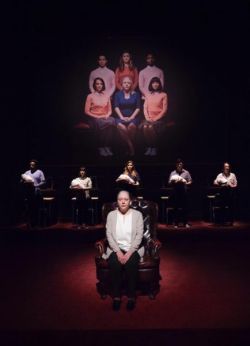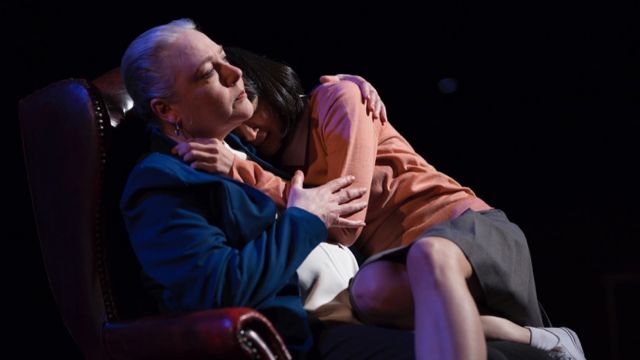Big Heart
A wealthy but childless woman adopts five babies: from Vietnam, Nicaragua, Sudan, Bosnia and Australia. She has a big heart. Thus begins Patricia Cornelius’ and Susie Dee’s layered, ironic, subtly angry take on colonialism, privilege and the idea of ‘motherhood’. But this writer and this director are too smart and too skilled in theatre craft to present a polemic or a tract. Big Heart is ambivalent, ambiguous and deeply unsettling. A hush falls over the audience; we are still. We can see what’s happening, we understand what’s happening, but we are not too sure what to make of it…
‘Mother’ (Andrea Swifte) explains herself direct to the audience: she has had a life of privilege – she knows it – but, she seems to imply, there is no use apologising. Her adopted children step forward, one after the other, into Rachel Burke’s pools of light. A brilliant touch: each of the ‘children’ are adult actors – that is, what they will become – while each holds her or his baby self in swaddling clothes, the bundle that is their beginning, in their birthplace. But babies grow up. As they grow, they are, each of them, like any child, desperate for affection, for cuddles, for attention. They compete for these things. All five of them. Mother gives them all a cuddle, all at once. She has a big heart. Mother is wealthy. The children go to the ‘best’ schools; they never want for anything. Soon the stage is carelessly littered with sports and electronic equipment. The fractious, ungrateful behaviour of adolescents begins. Rudeness, contempt, snarls of, ‘You’re not my mother!’ Mother insists she is and indeed she is: the only mother they have known…
 Mother takes them all on a world tour, to each of their birth countries, so that they will know the culture from which they’ve come – but they are still hers. The children, however, get curious; they notice or have it pointed out to them that they different, and they go searching, investigating, yearning for their ‘real’ mothers. Not Elizabeth (Kasia Kaczmarek) the girl from Bosnia; she isn’t too interested: she’s manically competitive. She must be the best, the best, the best and loved the most! How sad. The girl from Nicaragua, Charlotte (the always wonderful Daniela Farrinacci), finds her mother in Managua and learns Spanish. She boasts that she has a ‘real family’ now. The others, despite their own ambivalence, insist that they are her brothers and sisters. Edward (Vuyo Loko), from Sudan, starts hanging out with other black kids and coming home at 3 am. When Mother confronts him, he’s violent. Daniela (Elmira Jurik), from Vietnam, is shockingly abusive when sprung taking a dangerous drug to make her skin ‘white’. Through all this, Mother is disturbed, but she remains calm, rational, understanding but firm. She betrays no doubt at all at her actions or at the situation of her children. Her strength is impressive, but rather chilling at the same time… And yet, she is Mother and the bond is unbreakable. Almost: Charles (Sermsah Bin Saad), the Australian indigenous boy, leaves the nest, returning only to say goodbye. Unlike the others, he has found a welcome elsewhere.
Mother takes them all on a world tour, to each of their birth countries, so that they will know the culture from which they’ve come – but they are still hers. The children, however, get curious; they notice or have it pointed out to them that they different, and they go searching, investigating, yearning for their ‘real’ mothers. Not Elizabeth (Kasia Kaczmarek) the girl from Bosnia; she isn’t too interested: she’s manically competitive. She must be the best, the best, the best and loved the most! How sad. The girl from Nicaragua, Charlotte (the always wonderful Daniela Farrinacci), finds her mother in Managua and learns Spanish. She boasts that she has a ‘real family’ now. The others, despite their own ambivalence, insist that they are her brothers and sisters. Edward (Vuyo Loko), from Sudan, starts hanging out with other black kids and coming home at 3 am. When Mother confronts him, he’s violent. Daniela (Elmira Jurik), from Vietnam, is shockingly abusive when sprung taking a dangerous drug to make her skin ‘white’. Through all this, Mother is disturbed, but she remains calm, rational, understanding but firm. She betrays no doubt at all at her actions or at the situation of her children. Her strength is impressive, but rather chilling at the same time… And yet, she is Mother and the bond is unbreakable. Almost: Charles (Sermsah Bin Saad), the Australian indigenous boy, leaves the nest, returning only to say goodbye. Unlike the others, he has found a welcome elsewhere.
It is an added pleasure (if I can use that word in the context of this harrowing play) to see such diversity among the cast on stage. Not everyone is, so to speak, ethnically accurate’, but the contrasts and differences are clearly visible – and audible. All are pitch perfect – and Andrea Swifte’s near deadpan, near monotone delivery is a beautifully judged depiction not just of the character of Mother, but of the idea of the character in all her certainty.

The ambiguities and contradictions, and the different trajectories of the ‘children’ are established with superb economy. (The play runs about 90 minutes without an interval.) The exchanges between Mother and children or among the children themselves are short and sharp, devoid of embroidery or rhetoric. Marge Horwell’s design is stark but expressive of the play’s themes. A huge formal portrait of the ‘family’ hangs over the stage, as if they are a united traditional unit. The children’s implicit conformity is suggested by their ‘rooms’, represented by five identical desks on which sit five identical lamps. Wardrobe changes are limited to the largest time jump toward the end. Darius Kedros’ sound design envelopes the action rather than coming in over it, at times sharply juxtaposing with what we see.
Towards the end of the play, Mother lists her investments, the sources of her wealth, which has, of course, provided the lovely home, the good food, the private schools, the toys, the international travel and, in a sense, Mother’s enduring forbearance. Her investments are in all of the continents from which her children have come, the kind of investments which provide the dividends for our super funds too. And we know, as we listen, that each of these wise investments is in profitable enterprises that are morally or environmentally dubious. Donald Horne wrote that Australian writers rarely write about the ruling class – almost as if there were none. ‘This is very convenient,’ he wrote, ‘for the ruling class’.
It is somewhat unusual for Patricia Cornelius to write about the ruling class, but here she does it incisively and powerfully, and she is confrontational in a quite different way. Susie Dee’s direction adds layers, amplifies and reveals the argument. Big Heart questions the myth of our ‘big heart’ but does so by revealing the moral complexities beneath the myth. This is a play that lingers in the mind – in its ideas and its images.
Michael Brindley
Photographer: Pier Carthew.
Subscribe to our E-Newsletter, buy our latest print edition or find a Performing Arts book at Book Nook.

